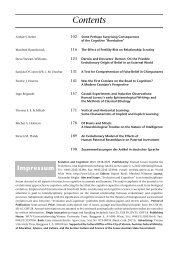The Seven Sins of Evolutionary Psychology - Konrad Lorenz Institute
The Seven Sins of Evolutionary Psychology - Konrad Lorenz Institute
The Seven Sins of Evolutionary Psychology - Konrad Lorenz Institute
You also want an ePaper? Increase the reach of your titles
YUMPU automatically turns print PDFs into web optimized ePapers that Google loves.
A Continuing Critique <strong>of</strong> <strong>Evolutionary</strong> <strong>Psychology</strong>before we developed the practice <strong>of</strong> communicatingin more measured, less dynamic spoken tones (WAL-LIN/MERKER/BROWN 1999). However, since we knowso little about the neurodynamics that create the capacityfor speech, we agree with those modern linguists(e.g., LIEBERMAN 2000) who believe that our facilityfor speech is an outcome <strong>of</strong> primitivesubcortical systems for communicative intent interactingwith comparatively more plastic, higher corticalsystems through complex developmental trajectories.Yes, human speech functions do tend to getfocussed in specific regions <strong>of</strong> the brain during development,but the question that we must all now consideris how such specialization actually emerges. Wethink that aside from cortico-limbic participation(e.g., the anterior cingulate systems for communicativeintent), most <strong>of</strong> language may emerge via epigeneticplasticity in fairly general-purpose, but highlymulti-modal learning circuits <strong>of</strong> the neocortex. Certainsubcortical systems (e.g., the basal ganglia) maybe decisive in the emergence <strong>of</strong> such higher abilities(LIEBERMAN 2000; BREITENSTEIN, et al. 2001).We suspect that PITCHFORD would generally agree,even though he is adverse to admitting that subcorticalfunctions are important for evolutionary psychologiststo consider for as uniquely a human activityas propositional language. To what extent“language may have adapted to the emerging complexities<strong>of</strong> the brain rather than the other wayaround” (p111 <strong>of</strong> target article) remains an open issue,no matter how strongly certain individuals (includingourselves, <strong>of</strong> course) believe in certain evolutionaryscenarios. And surely PITCHFORD would agreethat our ability to read and write, not to mentionmost <strong>of</strong> our numerical abilities (beyond primitivecounting), are largely culturally induced skills thatmay have rather little do to with specific evolutionaryselection for such abilities (even though we suspectthat behavior geneticists could certainly select forsuch skills by increasing the speed and quality <strong>of</strong> certainhigher cortico–cognitive abilities). If so, are thesewidespread skills <strong>of</strong> the members <strong>of</strong> human societiesexamples <strong>of</strong> adaptations, exaptations or spandrels?To some extent, and understandably, PITCHFORD’sflogging <strong>of</strong> our view may be based on his failure tobe conversant with what the senior author has writtenin the past (e.g., PANKSEPP 1998a, 2001a). Just tohighlight how committed we are to the developmentalsystems view, we refer PITCHFORD to the seniorauthor’s vigorous advocacy <strong>of</strong> treating ADHDwith environmental approaches, and the ongoingfight against prevailing pharmacological interventionsfor ‘normal’ childhood impulse-control problems(PANKSEPP 1998b,c). It is quite remarkable to usthat in the same sentence, PITCHFORD indicates thatthe accomplishment <strong>of</strong> <strong>Evolutionary</strong> <strong>Psychology</strong> (i)“compares extremely favorably with that based onthe neurochemical individuation <strong>of</strong> traits and disordersadmired by” us, but which have (ii) “producedso many unsatisfactory theories and treatments(VALENSTEIN 1998)”. Is he suggesting that <strong>Evolutionary</strong><strong>Psychology</strong> has also produced an abundance <strong>of</strong>the latter?In any event, we believe that VALENSTEIN’s interestinghistorical analysis <strong>of</strong> the biological psychiatryrevolution was based on an older era <strong>of</strong> psychopharmacologyrather than the future neurochemical revolutionwe were discussing based on emergingknowledge concerning the highly specific functions<strong>of</strong> various neuropeptides (PANKSEPP 1993; 1998a). Wealso suspect that VALENSTEIN’s analysis was also influencedas much by his personal socio–politico–philosophicalleanings as his scientific ones (for more onthis issue see the “Politics and Tribalism” section).For instance, the senior author’s long-term advocacy<strong>of</strong> the foraging/SEEKING/expectancy view <strong>of</strong> lateralhypothalamic reward (PANKSEPP 1981, 1982, 1998a)was never supported by VALENSTEIN, whose work onthe plasticity <strong>of</strong> those systems originally threw thisfield <strong>of</strong> inquiry into theoretical chaos (VALENSTEIN/COX/KAKOLEWSKI 1970). Only when work by his ownclose colleagues suggested a very similar view (BER-RIDGE/ VALENSTEIN 1991), did this type <strong>of</strong> conceptemerge into more open consideration in behavioralneuroscience (ROBINSON/BERRIDGE 1993). VALENSTEINhas long championed the massive role <strong>of</strong> learningand plasticity in the emergence <strong>of</strong> psychologicalfunctions in the brain (and has strongly arguedagainst subcortical specificity <strong>of</strong> functions), and webelieve his analysis <strong>of</strong> the psychopharmacology revolutionwas motivated to some extent by his philosophical/democraticpoint <strong>of</strong> view.Moreover, we are most certainly not dualists <strong>of</strong>any stripe and Steven J. GOULD has not been ‘ourmentor’ (even though we admire his writing skillsand with the help <strong>of</strong> SEGERSTRÅLE’s (2000) analysis,better appreciate his humanistically motivated willingnessto present the other side <strong>of</strong> the argument inthe lucid, energetic and perhaps politically motivatedways that he has). Accepting the vast plasticity<strong>of</strong> the neocortex does not make us advocates <strong>of</strong> untenablevariants/hangovers <strong>of</strong> CARTESIAN thought.Our views are thoroughly naturalistic, monistic andmaterialistic (without abandoning our spiritual/humanisticcompass, which we believe is closely linkedto our deep animalian capacity to experience pro-Evolution and Cognition ❘ 67 ❘ 2001, Vol. 7, No. 1








